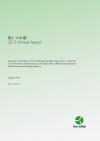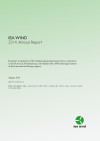Suchergebnisse für "Factsheet: Energietechnologien gestalten, die für alle sinnvoll und nutzbar sind"
Total Quality Design and Assessment of buildings as a strategy to increase the level of know-how with regard to the issue of "sustainable buildings".

Total Quality Design and Assessment is an instrument to increase the demand for high quality buildings; "high quality" in terms of improved comfort as well as decrease in negative environmental impact, at affordable costs. Application of TQ design targets requires additional and new knowledge, thus increasing the level of know-how with regard to the issue of "sustainable buildings".
plusFacades - International know-how- and knowledge transfer of "intelligent Facade systems" for Austrian players and key personnel
The project proceeds from the idea that prefabricated intelligent facade systems represent a promising technology for the energy efficient refurbishment of buildings. A goal is to process the present international state-of-the-art and the existing know-how to this topic for Austrian experts.
Renew Building - Competence Building and Knowledge Transfer for Climate-friendly renovation with ecological and renewable materials
The project Renew Building provided knowledge about eco-friendly renovation to the target groups (planners, architects, students of architecture, etc.) through theory and practice classes, lectures, an e-learning platform, and in an online knowledge database.
Innovation and Sustainability in the Construction and Housing Sector
Concepts for enhancing in-house innovation in construction; development of performance and benchmarking indicators in the housing sector. Economic proposals to improve legal and structural business environment and to increase sustainable and energy efficient construction and renovation activities.
IEA TCP Fluidized Bed Conversion (FBC). Working period 2013-2016
The Technology Collaboration Programme includes the collaboration, the exchange of relevant information and networking in the area of fluidized bed conversion of fuels applied for clean energy production.
IEA SHC Task 67: Compact Thermal Energy Storage Materials within Components within Systems
This Task aims to push forward the compact thermal energy storage (CTES) technology developments to accelerate their market introduction through the international collaboration of experts from materials research, components development and system integration. These technologies are based on the classes of phase change materials (PCM) and thermochemical materials (TCM). Materials from these classes will be studied, improved, characterized and tested in components.
Webinar: EBC Technical Day - Energy innovations for the city of tomorrow
June 24th 2020
Online
The Webinar highlighted activities of the IEA TCP ”Energy in Buildings and Communities” (EBC) as well as results from Austrian R&D projects funded within the Austrian research and technology programme “City of Tomorrow”.
Data-based processes for the creation and formulation of production data for complex industrial plants.
Development and evaluation of a process to automatically create models from existing production data of industrial plants. These models can be used to optimize the production process and plant equipment (scrap, quality, use of raw materials and energy) or to detect and predict faults.
Edible Seestadt - Green Seestadt - Learning for the Edible City of the Future
"Edible Seestadt" ("Essbare Seestadt") identifies which contributions an edible city provides for a climate-neutral resilient district and how this contribution can be sustainably stabilized and optimized.
Constructed Wetlands for Industrial Waste Water Treatment and Water Re-Use
Measures to achieve the aim of sustainable wastewater treatment, design and building of constructed wetlands for different types of industrial wastewater for selected enterprises in the food industry, monitoring in order to optimise systems performances
IEA Wind - Annual Report 2013

Herausgeber: PWT Communications, LLC für IEA Wind Energy Systems
Englisch, 180 Seiten
Downloads zur Publikation
IEA Wind - Annual Report 2014

Herausgeber: PWT Communications, LLC für IEA Wind Energy Systems
Englisch, 200 Seiten
Downloads zur Publikation
Eco-textiles - from the eco-niche into the trend market!
Optimum communication strategies and motives for the purchase of eco-textiles by specific target groups are investigated. The results are reviewed with respect to the transferability to other branches of sustainable production and marketing. Aim of the project is to foster the supply of eco-textile products and thereby promoting the Austrian eco-textile producers and retailers.
IEA Electric Vehicle Technology Collaboration Programme (EV-TCP)
The Technology Collaboration Programme on Electric Vehicles (EV TCP) vision is that the electric drivetrain will be used as the predominant transportation mode in a sustainable transport system that is preferably powered by renewable energy and does not produce harmful emissions.
Enerspired Cities - open and harmonized infomation basis for energy oriented urban planning
In "Enerspired Cities" the concept for an automized junction of judicial secured access regulation to (geo-)energy data is elaborated. This will be adapted to the specific situations in the cities of Innsbruck, Salzburg and Vienna and implemented in dedicated pilot applications. The declared aim is the support of urban planning, monitoring and research by an easy and transparent access to base data coming from various sources for a wide range of users.
IEA HPP Annex 28: Test procedure and seasonal performance calculation for residential heat pumps
Test procedure and seasonal performance calculation for residential heat pumps with combined space heating and heating of tap water - IEA Heat Pump Program Annex 28
EASEY - Ecological And Social EfficiencY
Developing an integrative concept for the evaluation of sustainability achievements of enterprises noted at Vienna's stock exchange.
Demonstration building of the eco²building system: First passive house prefabricated wood building system for commercial and industrial buildings
The EU funded "eco2building" construction system in a timber-frame based modular design represents a systematic approach for energy efficient commercial and industrial buildings. The object of the eco²building demonstration project - the logistics centre in passive-house quality for "Eine Welt Handel AG" - in Niklasdorf was to optimize the planning and construction processes and prepare for the market launch of the eco²building construction system. Accompanying research monitored and disseminated the experience.
Workshop: Low Tech - High Effect!
25. Februar 2016
IG Architektur, Gumpendorfer Straße 63 B1060 Wien, AT
Im Rahmen dieses ExpertInnenworkshops werden nachhaltige Bauweisen unter den Aspekt der Anwendung von Low Tech Lösungen diskutiert.
Digital Twin / Building Tracker - Coupling of building simulation with a physical building in real time
The goal of the project ist o couple an office building during operation with its virtual twin, the "building tracker", which will be developed and applied for the first time within the project. Thanks to coupling of monitoring and simulation, innovative building energy management of nearly zero-energy building is possible.
